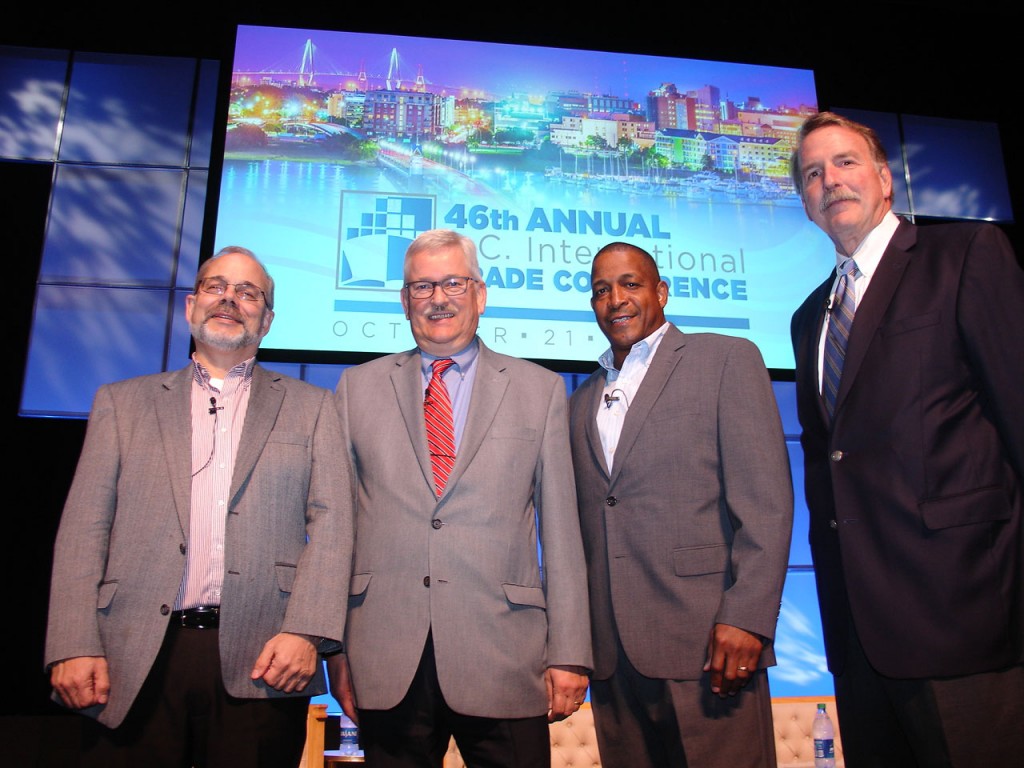Shippers seeking better service, simpler low-sulphur fuel costing
Ocean carriers need to improve customer service and simplify costing related to impending low-sulphur fuel requirements, according to a panel of shipping executives speaking today [Tuesday, Oct. 22] in Charleston, South Carolina.
The speakers – representing leaders in chemicals, forest products and power tools industries plus a major transportation intermediary – told attendees of the 46th annual South Carolina International Trade Conference that better service and a simpler cost approach to the IMO 2020 mandate for cleaner-burning fuels are top priorities.
“There’s so much worry out there,” said Klaus Schnede, manager of the North American marine category at Kingsport, Tennessee-based Eastman Chemical Co., which last year topped $10 billion in sales of specialty chemicals.
Much of the concern relates to the cleaner fuel mandate, which takes effect Jan. 1.
Schnede questioned whether the cost to shippers might be $200 or $350 or even $500 per 40-foot container shipment, and he said uncertainty even remains as to the capability of existing containership engines to run the required low-sulphur bunker fuel.
“There are still so many unknown factors,” Schnede said.

Marlon Jones, manager of international distribution at Memphis, Tennessee-headquartered International Paper Co., the world’s largest pulp and paper firm, with revenue of $23 million in 2018, joined fellow panelists in saying less-complex formulas are needed for determining what the fuel mandate will cost shippers.
“I think the carriers have overcomplicated things when it comes to the low sulphur,” Jones said.
Ashley Burt, senior director of transportation at Anderson, South Carolina-based power tools concern TTI, which has annual revenue of $7 billion, concurred, saying, “I think they’ve made it more complicated than it needs to be.
“We just want to make sure it’s fair and equitable and that it doesn’t become a profit center for the carriers,” Burt continued.
Tim Saling, executive vice president of The Apex Group, encompassing a leading non-vessel-operating common carrier in trans-Pacific trade, based in South San Francisco, California, said he believes “it’s a slippery slope” if carriers make a competitive factor out of compensation related to the fuel mandate.
“I think there is some requirement on the carrier to quell the uncertainty,” Saling said. “It should be pretty black-and-white.”
Customer service also is a major concern, according to members of the shipper panel.
Saling said he believes such worries are part of why shippers are increasing using NVOCCs in trans-Pacific trade.
International Paper’s Jones said that, over the past couple of years, service has dramatically improved at a small number of carriers, citing Ocean Network Express (ONE) as a positive example, while it has declined for several others. Schnede interjected that Hapag-Lloyd also has made significant service strides.
“We would like to see on-time performance improve across the board,” Jones said.
Saling said low service levels may relate to low ocean rates, stating simply, “The rates are too low.”
And Schnede said the rate and service relationship may be a tradeoff, commenting, “If the rates stay low as they are today, we might have to live with the customer service we have today.”
On another topic, Jones said he believes additional consolidation of ocean carriers is in the cards, commenting, “We don’t really want further consolidation, but I think it’s headed that way.”
Burt said he also anticipates more carrier consolidation, saying, “I think the consolidation will continue but at a slower pace. There aren’t a whole lot more options out there.”
Comprehensive coverage of the conference, including reception photos, is slated to appear in the Nov. 11 print edition of AJOT.
© Copyright 1999–2024 American Journal of Transportation. All Rights Reserved

